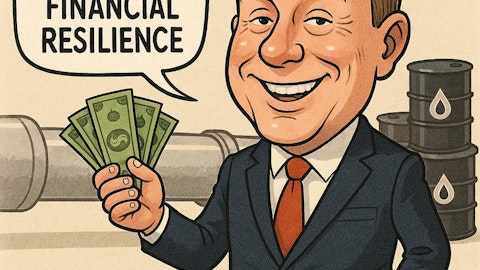In this article, we are going to discuss the energy stocks that are losing this week.
The oilfield services sector was the biggest loser in the energy industry this week following reports of a slowdown in drilling activity and reduced exploration and production spending due to a decline in crude oil prices. As of the writing of this piece, the sector has declined by over 4% since the beginning of 2025, against gains of more than 7% posted by the wider market.
The increase in supply, coupled with the global economic uncertainty caused by President Trump’s trade war, has put downward pressure on crude oil prices so far this year, leading to a lowered appetite for drilling. Moreover, the increasing efficiency of oilfield service companies has resulted in less drilling being necessary. According to Bloomberg, US oil drilling has dropped 12% so far this year to the lowest since the autumn of 2021.
As a result, the market has reduced its profits estimates for oilfield contractors ahead of the Q2 2025 earnings season, while also expecting the sector to lower its guidance for the second half of the year.

Our Methodology
To collect data for this article, we have referred to several stock screeners to find energy stocks that have fallen the most between July 11 and July 18, 2025. The following are the Energy Stocks that Lost the Most This Week. The stocks are ranked according to their share price surge during this period.
Why are we interested in the stocks that hedge funds pile into? The reason is simple: our research has shown that we can outperform the market by imitating the top stock picks of the best hedge funds. Our quarterly newsletter’s strategy selects 14 small-cap and large-cap stocks every quarter and has returned 373.4% since May 2014, beating its benchmark by 218 percentage points (see more details here).
10. Halliburton Company (NYSE:HAL)
Share Price Decline Between July 11 – July 18: 8.06%
Founded in 1919, Halliburton Company (NYSE:HAL) is one of the largest providers of products and services to the energy industry in the world.
Halliburton Company (NYSE:HAL) received a setback this week after Stifel lowered the stock’s price target from $32 to $31, while reiterating a ‘Buy’ rating on its shares. The price cut comes as the oilfield services industry continues to struggle following a slowdown in drilling activity amid choppy crude prices, economic uncertainty, and the impact of President Trump’s tariff war.
As a result, analysts expect Halliburton Company (NYSE:HAL) to post a 30% drop in profits in its Q2 2025 – the company’s worst decline since 2021.
9. Borr Drilling Limited (NYSE:BORR)
Share Price Decline Between July 11 – July 18: 8.29%
Borr Drilling Limited (NYSE:BORR) is a premier offshore shallow-water drilling contractor dedicated to providing exceptional drilling services to the global oil and gas industry.
Borr Drilling Limited (NYSE:BORR) fell after the analysts at BTIG downgraded the stock from ‘Buy’ to ‘Neutral’ as part of a broader research note on Offshore Oil Services names. The firm views the current slowdown in offshore drilling activity as a pause in the cycle, but still sees upside potential if utilization improves, keeping expectations tempered yet open.
However, it must be mentioned that Borr Drilling Limited (NYSE:BORR) shot up significantly earlier this month after the company announced that it had secured four new contracts worth over $124 million, bringing its total of new commitments so far in 2025 to thirteen.





